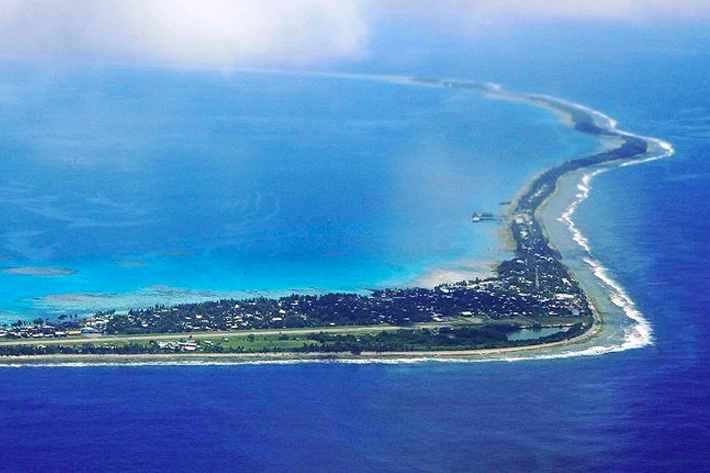The Australian government’s decision last week to approve multi-year extensions for three coal mines has been slammed by conservationists and greatly upset island nations in the Pacific.
The approvals announced by Environment Minister Tanya Plibersek have been damned as “reckless” by environmental groups and “immoral” by a minister on Tuvalu, one of the Pacific states most at risk from rising sea levels caused by global warming.
The Australian Conservation Foundation (ACF) said the three coal mines, in New South Wales, would generate more than 1.3 billion tonnes of greenhouse gas emissions in the many extra years they are now allowed to operate.
ALSO SEE: Continued Fossil Fuel Investments Put $557 Trillion ‘At Risk’
Plibersek approved a 13-year extension for underground mining by Whitehaven Coal at its mine in Narrabri until 2044; a 24-year extension for Mach Energy’s mine at Mount Pleasant (till 2048); and an eight-year extension for Yancoal’s mine at Ravensworth, up to 2032.
The mines at Narrabri and Mt Pleasant produce thermal coal for export that is burnt in power stations. The minister said the mines would be assessed under a government mechanism that aims to limit emissions at major polluting sites.
But climate and environmental groups were shocked at the decision, which the ACF hailed as “grossly irresponsible.”
Islands could dump Australia as Cop31 co-host
The decision could hurt the Albanese government’s chances of re-election in a national election that must be held by May next year – and kill Australia’s chance of co-hosting a UN climate summit with island nations in two years time.
Tuvalu’s climate minister, Dr Maina Talia, said it was “immoral and unacceptable to any country to open new fossil fuel projects, as Australia has recently done with the three coal-mine expansion projects it has just approved.”
In remarks to Guardian Australia, Talia said: “This is a matter of survival for my country of Tuvalu and for other nations in the Pacific. Australia calls itself a member of the Pacific family but this recent decision puts this statement in question.”
Anote Tong, a former Kiribati president who now heads the Pacific Elders’ Voice, said Pacific countries should not support Australia’s proposal to co-host Cop31, the UN climate summit due to be held in late 2026, if it continues to expand fossil fuel operations.
“I don’t believe the Pacific can be part of that when a country [Australia] is doing the very opposite of what a Cop [summit] is supposed to be doing,” he was quoted as saying.
“It seems a total contradiction to Australia’s professed position of being active on climate change.”

Australia-Tuvalu pact
The criticism by the Tuvalu minister was bold, considering Australia and the tiny island nation recently signed a landmark migration and security pact during a meeting of the Pacific Islands Forum in Tonga.
In May, Australian Foreign Minister Penny Wong announced $110 million in development initiatives for Tuvalu, including $50 million for the island’s first undersea telecommunications cable, $19 million for coastal adaptation and $10 million in direct budget support.
As part of the agreement, Australia promised to bolster Tuvalu’s coastal defences and open a resettlement pathway to 280 citizens every year, given the fact the low-lying island faces an uncertain future amid rising sea levels.
Australia also extended a security guarantee to Tuvalu, promising to come to its aid if it faces military aggression, a humanitarian disaster or a global pandemic, ABC News said.
Albanese briefed leaders at the forum on Australia’s Cop31 proposal and they were said to have largely welcomed the plan.
But the Marshall Islands President Hilda Heine warned that “action starts at home”, meaning that “sacrifices” must be made, and hoped Australia would have “a good story to tell at Cop31” – in shifting to renewable energy.
Fossil fuel treaty
A decision on where the conference will be held is expected at the Cop29 summit in Azerbaijan next month. Turkey is also reported to be in the running for the 2026 event.
Talia, meanwhile, lauded the Federated States of Micronesia for their “courageous stand” in New York last week, when it joined a campaign for a fossil fuel non-proliferation treaty, an idea proposed by British campaigners six years ago and endorsed by dozens of NGOs.
Tuvalu is one of 14 mostly island nations that have backed a treaty to “end the expansion of new coal, oil and gas projects and manage a global transition away from fossil fuels.”
Signatories say the proposed treaty “would complement the Paris Agreement by providing the global roadmap needed to halt the expansion of fossil fuel, manage an equitable phase-out of coal, oil and gas, and lay the foundations for a true just energy transition in which no worker, community or country is left behind.”
- Jim Pollard
ALSO SEE:
Decline in China’s Solar Output Seen Due to Oversupply – PV Mag
Big Tech’s Hunger For AI Power Unsettling ESG Investors
Most Effective Climate Policies Identified in New Study
Booming Solar Puts 2030 Renewable Energy Goals ‘Within Reach’
Online Misinformation Harming Climate Change Effort: UN Chief
Chinese Solar Giants’ Profits and Revenue Plunge in First Half
Big Oil All Talk And No Action on Climate Change, Report Says
Renewables Now Source of 30% of World’s Power – Guardian
























